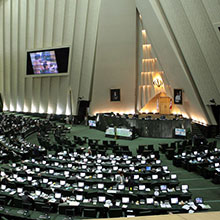Public and governmental Affairs in Iran
In order to understand the concept and principles of the Iranian public and governmental affairs, we have to first understand the decision-making organs of the country.
The decision-making organs and authorities in order of superiority
The Supreme Leader of the country

The Supreme leader or the Council of Leadership (the leadership in the form of the Council of Leadership has never been experienced yet) is the highest position within the framework of the government. This position has a political-religious superiority over the other authorities and people of the country.
The duration of service of the Supreme Leadership is unlimited and lasting until the death of the leader.
The authorizations of the Iran’s Supreme Leader:
According to Article 110 of the Iran’s Constitution, the authorizations of the Supreme Leader are as follows:
- Determination of the general policies of the country subsequent to the consultation with the “Expediency Discernment Council”;
- Having control and supervision over the appropriate implementation of the general policies of the country;
- Making the order of the public referendum;
- Supreme commanding of the armed forces of the country;
- Declaration of war and peace and unification of the armed forces;
- Dispute resolution between the executive, legislative and judicial branches of the government and regulating their relationships;
- Resolving the major issues which could not be solved via the ordinary solutions through referring them to the Expediency Discernment Council.
- Endorsement of the presidential decree after the election of the president;
- Dismissal of the president in favor of the public interest, and
- Pardoning or reducing the sentences of convicts, within the framework of Islamic criteria, after the head of the judiciary power has recommended such a motion.
The designation, dismissal and acceptance of resignation of the following positions are under authorization of the Supreme Leader
- The religious experts of the “Guardian Council”;
- The general manager of the “Organization of National Radio and Television”;
- The head of joint armed forces of the country;
- The head of the Islamic Revolution Guards Corps;
- The supreme commanders of the army and police forces;
The Executive Power in Iran
The Presidency
After the Supreme leader, the president is the highest authority in Iran. The president is responsible regarding enforcement of the Constitution and serves as the lead and head of the executive power of Iran except in the matters directly related to the responsibilities of the Supreme Leader.
The manner of election of the Iran’s president
The candidates of the presidential election, prior to be officially announced as the candidate, should be confirmed by the “Guardian Council”. The “Guardian council” has normally filtered all of the candidates who are not in line with the general policies determined by the Supreme Leader. Considering the filtering method of the government, only the candidates of the same ideology could be finally compete for the election.
According to Article 115 of the Iran’s Constitution, the president should be elected among the religious and political personalities having the following specifications:
- The president should have the Iran’s originality and nationality;
- Good capacity of management and decision making;
- Clear and positive precedent and past record;
- Trustworthiness and piety, and
- Belief in the basic principles of the Islamic Republic of Iran and the official religion of the country.
The president is elected by an absolute majority of votes of voters, in the event that none of the candidates enjoys such a majority in the first election, the two candidates with the highest vote cast should compete in a runoff election. In the runoff election, the simple majority, will determine the final winner.
The duties and authorization of the president of Iran
- The president is the chairman of the Cabinet;
- The deputy commander-in-chiefof Iran’s Amy;
- Declare an emergencysituation in the country and suspending all laws or enacting a state of martial law;
- The chairman of the Supreme National Security Council;
- The chairman of the Supreme Council of the Cultural Revolution;
- Appointment of the First Vice-President;
- Introducing of the Cabinet’s members to the Parliament;
- Acceptance of the foreign ambassadors;
- Issuance of the executive orders;
- Issuance of the medalsin honor of service for the country;
- Issuance of the presidential pardons.
It should be noted that the most of these authorizations require the final or prior approval of the Supreme Leader.
Click on the link below to read more:
Comments
Post a Comment